A Brief Colonial History Of Ceylon(SriLanka)
Sri Lanka: One Island Two Nations
A Brief Colonial History Of Ceylon(SriLanka)
Sri Lanka: One Island Two Nations
(Full Story)
Search This Blog
Back to 500BC.
==========================
Thiranjala Weerasinghe sj.- One Island Two Nations
?????????????????????????????????????????????????Wednesday, January 1, 2020
Australia bushfires: towns devastated and lives lost as blazes turn the sky red
Thousands shelter on beaches as fires rip through Victoria and New South WalesAustralia’s bushfire crisis has claimed at least two more lives, authorities confirmed on Tuesday, as dozens of fires tore through several towns on the east coast and forced thousands of people to take shelter on beaches.
Luke Henriques-Gomes @lukehgomes-
Two people – a father and son – died when fire hit the New South Wales town of Cobargo on Tuesday, while emergency services officials held grave fears for a third person, near Narooma, on the state’s south coast.
In Victoria, where more than 200,000ha has burned in the state’s east, at least four people were unaccounted for. The armed forces stand ready to evacuate those sheltering on the state’s beaches if needed.
Eleven people have been confirmed dead across all states in this year’s bushfire season so far.
The NSW Rural Fire Service commissioner, Shane Fitzsimmons, said it was “absolutely” the state’s worst bushfire season on record as he warned the reality of the damage would become clear only once the fires were under control.
“We need to brace ourselves for a considerable number of properties, a considerable number of homes that are likely to have been damaged and or destroyed right across these eight emergency warning fire areas, given the extraordinary nature of the fire behaviour and fire spread today,” he said.
“We’ve seen extraordinary fire behaviour,” he added. “What we really need is meaningful rain, and we haven’t got anything in the forecast at the moment that says we’re going to get drought-breaking or fire-quenching rainfall.”
In his new year message, the prime minister, Scott Morrison, said the fires were having a “devastating impact” and warned that the weeks and months ahead would “continue to be difficult”.
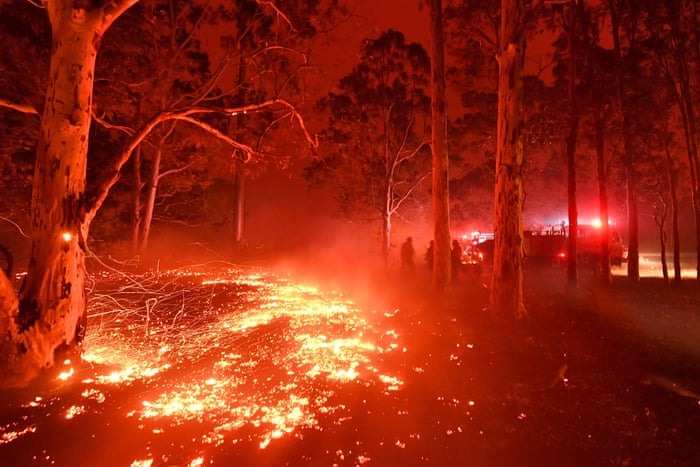
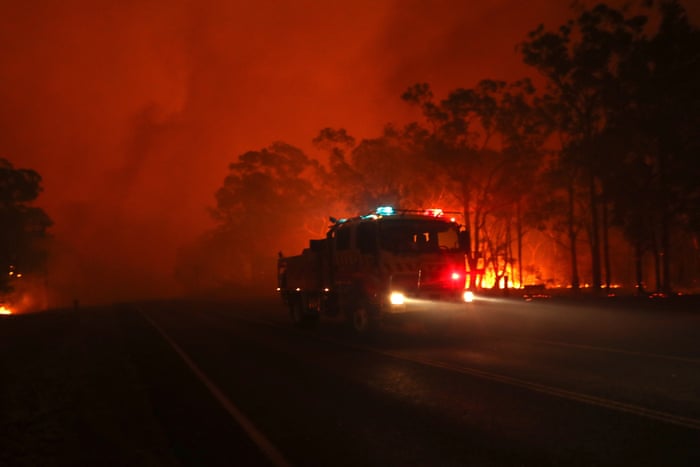
Flames rage near properties on the Sussex inlet road, south of Nowra. Photograph: Mike Bowers/The Guardian
“I wish we had better news on New Year’s Eve but one news we can always take comfort in is the amazing spirit of Australians,” he said. “We have faced these disasters before and we have come through.”
The fire crisis swept up the coast during the day, beginning with dramatic scenes in Mallacoota, in the far south-eastern corner of Victoria, where about 4,000 people fled their homes and took refuge on the beach and in boats as multiple fires surrounded the town, turning the sky black by 9am, and then a hazy red.
Late in the day, there was a rare flash of hope when changes in wind direction meant that the fires subsided in Mallacoota, but authorities said numerous homes had been lost. Residents returning to their homes were urged to boil tap water before drinking it as Forest Fire Management Victoria said the fires had put heavy demands on tap water that was affecting the supply of water.
As the day progressed, similar scenes unfolded all the way up the NSW south coast, including in large towns such as Batemans Bay and popular holiday destinations such as Bermagui in the south, all the way up to Jervis Bay, 250km further north.
Cobargo, a village a few kilometres inland from Bermagui, lost much of its main street as the fires swept through. Further north the town of Mogo suffered similar devastation, although dozens of animals in its popular wildlife park were saved by staff.
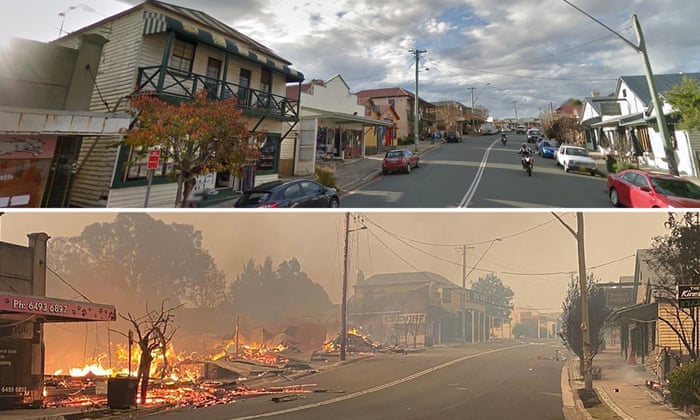
Cobargo, New South Wales, before and after bushfires destroyed a number of businesses on New Year’s Eve. Composite: Google Maps/Twitter
Late on Tuesday evening, NSW police announced that all telecommunications would be lost for a 150km stretch of the coast between Nowra and Moruya.
More than 120 bushfires were still ablaze on Tuesday evening, including eight at emergency level, and crews were concerned some blazes in Victoria could jump the border into NSW fuelled by a southerly wind.
The defence minister, Linda Reynolds, announced that the Australian Defence Force would deploy helicopters, fixed-wing aircraft and naval vessels to assist in supplying and potentially evacuating people trapped by the Victorian fires, after a request from the state premier, Daniel Andrews.
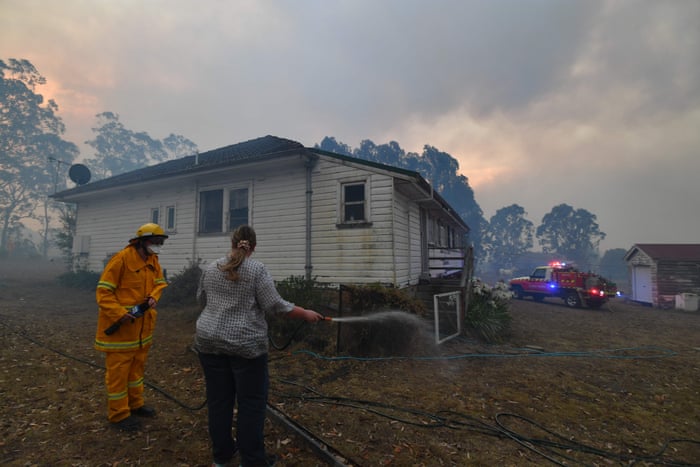
A resident tries to hose down her home in the hope of saving it from nearby bushfires around the town of Nowra in New South Wales. Photograph: Saeed Khan/AFP via Getty Images
Victorian authorities are yet to quantify the damage across East Gippsland but said a “significant” number of homes had been lost and at least one primary school destroyed, while many livestock are also expected to have died.
Of the four people missing across East Gippsland, Andrews said: “We do have very real fears for their safety. They have been in active fire environments.”
On Tuesday afternoon, police in NSW confirmed that a father and son had been killed in fires at Cobargo. The two men were protecting their homes in the Bega Valley.
Another man was unaccounted for west of Narooma, on the NSW south coast. “Unfortunately we think the news in that house will not be good either,” said the NSW police deputy commissioner, Gary Worboys.
Pictures posted to social media from countless small communities up and down the coast and inland suggested a huge number of properties had been destroyed, adding to the 900 confirmed lost in New South Wales in this year’s fire season until last week.
On Tuesday evening, large fires were still burning out of control including the 31,000ha Clyde Mountain fire near Batemans Bay, the 26,000ha Green Valley fire east of Albury and the 64,000ha Countegany fire east of Cooma .
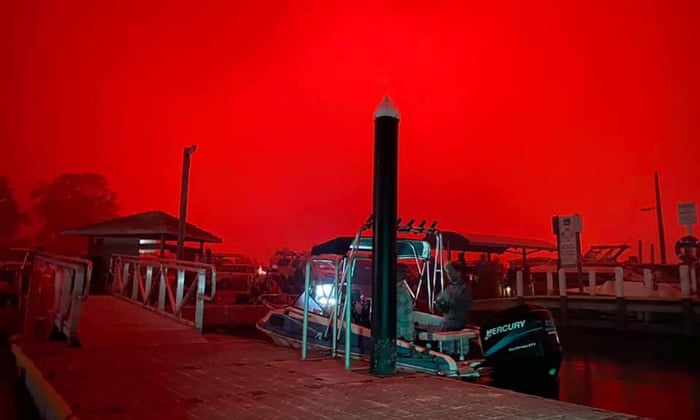
A family board a boat in Mallacoota to seek shelter from fires on Tuesday morning. Photograph: @BradleyWDeacon
The opposition leader, Anthony Albanese, called for a meeting of federal, state and territory governments, noting fires were burning across multiple states. “I again say to the prime minister that it isn’t acceptable, in my view, to say [the council of state and federal governments] doesn’t need to meet until March,” he said.
Fire chiefs in NSW have said they expect the fires to continue to burn until the state receives sustained rainfall. Tasmania, Western Australia and South Australia have also faced bushfires in recent days.
Albanese also described the City of Sydney’s decision to go ahead with the New Year’s Eve fireworks as “problematic”. Some communities had cancelled their celebrations for safety and sympathetic reasons, but amid considerable debate in Sydney over the $6m display, traditionally one of the largest in the world, authorities said the show could go ahead despite potentially dangerous conditions.
More than a million people turned out for the celebrations.
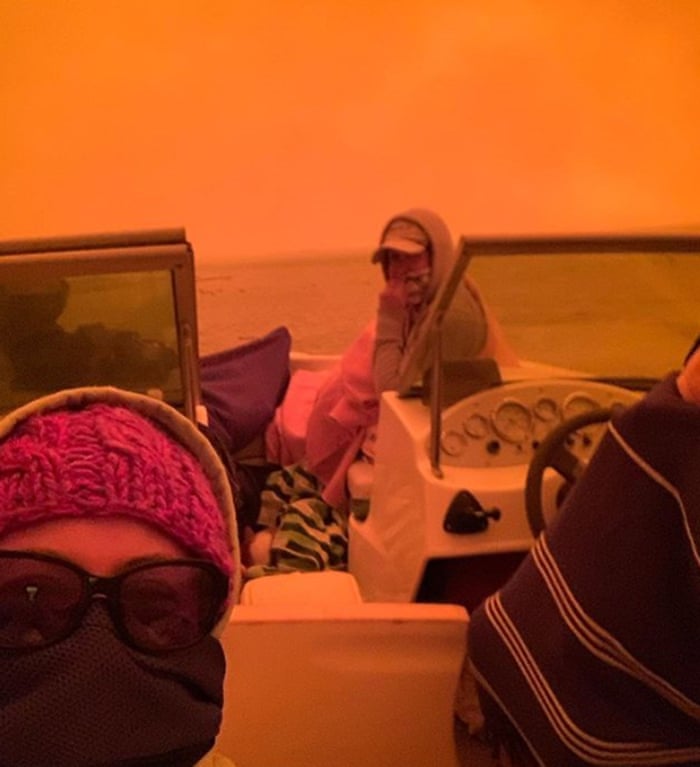 Some have said holding the display would be insensitive, but the NSW premier, Gladys Berejiklian, backed the move.
Some have said holding the display would be insensitive, but the NSW premier, Gladys Berejiklian, backed the move.“I understand the decision to proceed and on balance I support that decision,” she said. “It’s not without acknowledging how there are mixed feelings in the community about it.”
On Tuesday the NSW firefighter who died the previous day was named as Samuel McPaul, 28. McPaul was killed while fighting fires 70km east of Albury, near the Victorian border, when the 10-tonne truck he was in was overturned by a freak “fire tornado”. McPaul’s wife Megan is expecting the couple’s first child in May.
People on a boat taking shelter from the bushfires hitting the area around Mallcoota. Photograph: HANDOUT/Courtesy of Ida Dempsey/AFP via Getty Images

